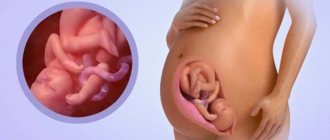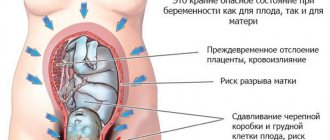Methods for calculating gestational age
If a little more than a month has passed since the beginning of the last menstruation, according to the obstetric method of calculating the period, the sixth week of pregnancy has begun. The embryonic method starts counting from the expected day of ovulation. Normally, this process occurs in the middle of the menstrual cycle. In accordance with this, there is a difference of 2 weeks between the embryonic and obstetric stages of pregnancy. The sixth week according to the embryonic method corresponds to the eighth obstetric week.
The disadvantage of the embryonic method is that it is inaccurate in case of an irregular menstrual cycle, when a woman’s periods come at a different time each time. This feature of the body can be individual; it arises as a result of the abolition of hormonal contraceptives, the appearance of hormone-dependent pathologies.
In this case, other methods for determining the gestational age are used:
- Measuring the size of the fetus during an ultrasound;
- Determination of the date of the first fetal movement (during the first pregnancy, movement is felt at 20 weeks).
The accuracy of determining the duration of pregnancy is important for calculating the expected date of birth, determining the start date of maternity leave, and issuing sick leave.
Therapy methods
The choice of treatment tactics for nagging pain depends on the cause of its occurrence. If there is a threat of miscarriage in the early stages of pregnancy, a woman is prescribed:
- Preparations that contain parthusisten - a substance whose action leads to relaxation of the muscular fibers of the uterus.
- Medicines containing hecoprenaline are a selective sympathomimetic that reduces the frequency and intensity of spontaneous contractions.
- Hormones (progesterone) stabilize the activity of the uterus, reduce its tone, normalize the trophism of the fetus and uteroplacental circulation.
To stop the inflammatory process, cephalosporin antibiotics are used.
Ectopic pregnancy is treated with radical methods: an operation is performed during which the fertilized egg is removed. The issue of preserving the fallopian tube is resolved privately.
If the lower abdomen hurts without discharge during early pregnancy, the woman may be offered treatment with physiotherapy. For these purposes, electrophoresis with Papaverine and Dimexide and dry heat are prescribed. To achieve a therapeutic effect, ten sessions are required.
How to confirm pregnancy - 4 methods
At the 6th week of pregnancy, test strips or a blood test for hCG will definitely show a positive result, since in the blood and urine of a pregnant woman there is an increased content of human chorionic gonadotropin, a hormone secreted by the corpus luteum of pregnancy.
During an ultrasound scan of the uterus, the embryo at the 6th obstetric week of pregnancy looks like a tiny light dot against the background of a darker uterus. Ultrasound is performed according to indications; this method is not used at this stage to determine the period.
Possible information obtained during an ultrasound at 6 weeks:
- Presence of multiple pregnancy;
- Presence of ectopic pregnancy;
- Presence of embryonic heartbeat.
It is impossible to determine the sex of the fetus at this stage, since the external genitalia of the embryo are not yet developed.
During a gynecological examination, the doctor will definitely detect visual signs of pregnancy - an enlargement of the uterus to the size of a plum, a change in its color. Outwardly, a pregnant woman in most cases looks as usual - her belly has hardly increased.
Pain as a sign of pregnancy
Are your periods late? This sign most often indicates that you will soon become a mother, and even more so if the test also shows a positive result. However, many women begin to suspect pregnancy even before the delay. They learn about this from their body.
The very first sign that you should pay attention to is when the lower abdomen and lower back are pulled. Almost all women experience such pain. It’s just that some people don’t attach much importance to this, while for others they cause certain inconvenience, even discomfort. If the expectant mother before pregnancy was bothered by pain in the abdominal area before the onset of menstruation, then she simply may not pay attention to them.
What happens to the fetus at 6 weeks?
At the 6th obstetric week of pregnancy, the embryo has already existed for 4 weeks. It weighs about 4 g, its height is 1 cm, and the embryo itself looks like a cylinder, curved in the shape of the letter C. The volume of amniotic fluid is 3 milliliters. At the head end of the cylinder, brain vesicles appear - the rudiments of the future cerebral hemispheres. The neural tube is tightened, it is transformed into the embryonic nervous system. Cells of the future central nervous system begin to rapidly multiply.
Thanks to this, the embryo begins to respond to external stimuli by bending in lateral directions. On the future face, the rudiments of the nose, ears, and mouth stand out, and the eye pits are noticeable - optic vesicles. Internal organs continue their formation - the liver, lungs, trachea, bronchi, stomach, trachea, pancreas develop. One of the most important organs of the immune system, the thymus, or thymus gland, begins its development.
The little heart still looks like a tube, but it already makes about 140 beats per minute. This heart rate is normal for a fetus at 6 weeks of pregnancy. The heartbeat can already be detected and measured during an ultrasound scan.
The embryo develops cartilage tissue - the basis of the future musculoskeletal system. On the side opposite the head end, the fetus has a tail, which in the future will become the coccyx. Knee and elbow bends are visible on the fetal limbs, and the fingers grow slightly.
Fetal development
In the sixth week of pregnancy, the baby resembles the letter “C”. Its limbs are already beginning to develop and it has gills. By the end of the 6th week, the auricles begin to form instead. There are already the rudiments of the circulatory system, small vessels are gradually developing, which in the future, with the formation of the umbilical cord, will connect the fetus with the maternal body.
The heart begins to form. Two heart tubes are already pulsating. Over time, they will merge together and form a two-chambered heart. The neural tube begins to form the brain and spinal cord. The intestinal tube is already divided into three. In the future, these are the thyroid, parathyroid glands and pituitary gland. There are rudiments of the respiratory system, liver, and pancreas.
At the full 6 weeks of pregnancy, the embryo has already grown in length by more than 1 cm. It can tilt to the right and left. At the same time, the fetal bladder develops, inside which amniotic fluid gradually forms.
What happens in the female body?
At the 6th week of pregnancy, the active development of the umbilical cord and placenta begins - the baby's place, which supplies the fetus with nutrition and oxygen until birth. Until now, these functions have been assigned to the yolk sac, which will soon cease to exist. The amniotic sac will provide the fetus with reliable protection from external physical influence. Already at this stage, the fetus is able to move in the amniotic fluid.
The uterus, which has increased in size, puts pressure on the bladder, forcing the woman to urinate frequently. When the uterus rises above the level of the womb, these sensations will no longer bother the pregnant woman. It is important at this stage to differentiate such a symptom of pregnancy from signs of cystitis - pain and cramping in the lower abdomen, radiating to the lower back. If not treated promptly, the infection will spread upward to the ureters and kidneys, causing pyelonephritis.
At this time, it is time to register with the antenatal clinic, even if the woman does not feel any negative symptoms and the pregnancy is easy. The doctor will prescribe the necessary diagnostic procedures and take vitamin and mineral complexes.
Recommendations
- At this time, you can already register with the selected maternity hospital and contact a specialist who will become your indispensable assistant for the entire 9 months.
- Complete all tests and examinations.
- Be sure to eliminate alcohol and nicotine. This should have been done a long time ago.
- Avoid stressful situations, if possible, do not get into any quarrels even over trifles.
- Drink plenty of fluids.
- Protect yourself from colds, as elevated temperatures can harm the fetus.
The sixth week is the period when the embryo begins to develop into a full-fledged child. At this time, it is necessary to behave extremely carefully and carefully monitor all processes in the body, avoiding negative factors. Pregnancy has already been confirmed, so strictly follow all the doctor’s recommendations.
-{amp}gt; READ ABOUT 7 WEEKS OF PREGNANCY
At the 6th week of pregnancy, the following tips will be relevant for expectant mothers:
- The calorie content of the diet should be increased, but only by 10%, which will be quite enough to meet the nutritional needs of the fetus.
- Food should be as varied as possible.
- If the work of the expectant mother is associated with a possible risk for the unborn baby, for example, lifting heavy objects or frequent business trips is required, it is recommended to register as early as possible and obtain the appropriate certificate in order to take advantage of the rights and reduce the level of workload.
- Those women who have problems with the thyroid gland urgently need to take a blood test to determine the level of hormones and, if necessary, select the appropriate drug. Lack of thyroxine production in a woman’s body can dramatically slow down the development of the fetus.
- You should protect yourself from colds and other possible infections and reduce contact with other people, especially during epidemics of influenza and other diseases.
- On the advice of a doctor, you can take medications that compensate for the deficiency of certain vitamins and microelements, for example, Magnelis, which contains a sufficient amount of magnesium. But self-prescription of any medications is unacceptable, as this can provoke negative changes in the development of the fetus. Also, before taking it, you need to read the description of the drug and possible contraindications. And also don’t forget about taking folic acid!
Hormones
The content of the main pregnancy hormone, progesterone, continues to increase. Progesterone maintains pregnancy, ensuring its normal course, preventing increased uterine contractions. Human chorionic gonadotropin, or hCG, secreted by the placenta, increases its concentration in the blood of a pregnant woman. Normally, hCG levels rise until the end of the first trimester of pregnancy, and progesterone levels rise until the fortieth week of pregnancy. Hormone levels are monitored if there is a threat of miscarriage or if an ectopic pregnancy is suspected.
What causes nagging, aching pain during pregnancy?
When the egg is implanted in the uterus, it actively develops. By six weeks, the embryo develops internal organs and a neural tube.
Therefore, during this period, the unborn child is especially susceptible to negative environmental factors acting on him through the mother’s body.
The following pathologies that cause pain may develop:
- increased tone of the uterine muscles with the threat of sudden termination of pregnancy;
- insufficient production of hormonal substances with miscarriage;
- the appearance of bleeding from the vagina like menstruation;
- damage to the amniotic sac threatening the life of the child;
- sexual infections;
- inflammatory process of the kidneys, bladder, urethra;
- Rh conflict between mother and fetus;
- the development of a systemic bacterial infection or virus in a woman’s body, transmitted through the placenta, infecting the fetus;
- diseases of the digestive tract (flatulence, dysbacteriosis, colitis, ulcers).
If any condition is suspected, undergo immediate examination.
It includes the following tests:
- identification of Rh factor and blood group;
- general clinical examinations of urine, blood, feces;
- detailed leukocyte formula, coagulogram;
- determination of antibodies to viruses that often cause fetal development abnormalities (detection of immunoglobulins G, M);
- Ultrasound of the abdominal organs, pelvis.
Based on the data obtained, an accurate diagnosis is made, determining the cause of the nagging pain. If studies are carried out in the early stages, the disease is detected and eliminated in a timely manner. The danger to the child is reduced. When the disease is advanced, the doctor prohibits giving birth naturally, prescribing a caesarean section.
Feelings of a pregnant woman at 6 weeks
The general condition due to the effects of hormonal changes in the body is characterized by loss of strength, constant fatigue and lethargy, and changes in emotional state. The mood can change dramatically within a short time from euphoria to moodiness and increased irritability. Taste preferences change - favorite foods are no longer attractive, and strange for others addictions to absorb sweet, salty, exotic fruits, and minerals appear.
Physical changes in a woman’s body:
- cessation of menstruation;
- increased sensitivity and soreness of the breast;
- darkening of the nipples and areolas around them;
- increase in waist size;
- digestive disorders - heartburn, colic, constipation;
- decrease in blood pressure;
- changes in the condition of the skin of the face and body - the appearance of acne, porosity and looseness of the epidermis;
- increased sensitivity to temperature fluctuations.
All changes are associated with changes in the physiology of the female body, designed to maintain pregnancy.
Video about what happens in the female body at 6 weeks of pregnancy, about sensations and possible problems:
How does a woman feel in the sixth week?
Most women wonder whether sex is possible in this condition, especially when the 6th week of pregnancy has begun and the woman already knows exactly about her condition.
Experts, if the expectant mother feels normal, there is no threat of miscarriage, bleeding, or pain in the lower abdomen, do not see any harm in having sex in the first weeks of pregnancy. It is worth limiting sex if a woman has previously had problems with bearing a child (spontaneous miscarriages).
External features
Toxicosis
It is absolutely not necessary that the signs of toxicosis correspond to the common stereotype - nausea and vomiting, complete aversion to food. Many women go through pregnancy without experiencing these symptoms, or experiencing them only mildly.
At week 6, the following symptoms of toxicosis may appear:
- aversion to strong odors;
- selective attitude towards certain foods, especially protein foods;
- morning sickness, vomiting;
- decreased appetite;
- increased salivation;
- dizziness, headache.
To reduce discomfort, you need to take the first meal without getting out of bed. A light breakfast of a cup of tea, crackers or lean cookies will help smooth out the manifestations of toxicosis. The reason for the appearance of symptoms of toxicosis is the body’s adaptive reaction to pregnancy and the appearance of a fetus with characteristics different from its own parameters. Indomitable vomiting requires medical supervision in a gynecological hospital. Severe early toxicosis can become a threat to pregnancy.
Video about fetal formation at 6 weeks of pregnancy, early toxicosis and visual signs:
Fetal development
In the sixth week of pregnancy, the baby resembles the letter “C”. Its limbs are already beginning to develop and it has gills. By the end of the 6th week, the auricles begin to form instead. There are already the rudiments of the circulatory system, small vessels are gradually developing, which in the future, with the formation of the umbilical cord, will connect the fetus with the maternal body.
The heart begins to form. Two heart tubes are already pulsating. Over time, they will merge together and form a two-chambered heart. The neural tube begins to form the brain and spinal cord. The intestinal tube is already divided into three. In the future, these are the thyroid, parathyroid glands and pituitary gland. There are rudiments of the respiratory system, liver, and pancreas.
At the full 6 weeks of pregnancy, the embryo has already grown in length by more than 1 cm. It can tilt to the right and left. At the same time, the fetal bladder develops, inside which amniotic fluid gradually forms.
Abdominal and lower back pain
The only acceptable pain at 6 weeks of pregnancy is a weak sensation in the form of light contractions, or a slight nagging pain in the lower back. They indicate stretching of the ligaments of the growing uterus or the effect of progesterone on the tissues of the reproductive organs. Normally, these sensations last until the 20th week of pregnancy.
Intense pain, severe cramps, accompanied by bloody discharge - a symptom of trouble (threat of miscarriage, ectopic pregnancy). Perhaps this is how surgical pathology manifests itself (appendicitis, renal colic), or the genitourinary system becomes infected with pathogenic bacteria. In any case, you should consult a doctor to determine the source of the negative feelings.
The cause of miscarriage can be mental or physical stress, overheating, or pathologies of fetal development. If the pregnancy cannot be maintained, it must be terminated in a hospital setting with minimal consequences for the woman.
An ectopic pregnancy occurs due to the development of an embryo in the fallopian tube or in the woman's abdominal cavity. The growing fetus stimulates the tube to rupture, causing heavy bleeding and loss of consciousness from painful shock. Only urgent surgical intervention with removal of the tube can save a woman’s life.
What changes occur in a pregnant woman's body?
External features
The process of embryo development continues at a rapid pace, with further formation of important organs and systems occurring. At week 6, the influence of various negative factors (medicines, alcohol, excessive physical activity) can not only harm the embryo, but even kill it.
Despite its tiny size and weight, the embryo's heart beats twice as fast as the mother's, but has not yet fully formed: it will later divide into atria.
At the 6th week of pregnancy, two small tubercles begin to appear in the embryo in the place where the arms will develop in the future, and later two more begin to form in place of the legs. In parallel, the formation of cartilage tissue occurs, from which bones, tendons, etc. will later begin to develop. The development of the chest also occurs.
The 6th week of pregnancy “changes” the baby’s face: the jaw, nose, mouth begin to appear, the ears develop, and the rudiments of teeth are formed. The eyes, which look very large in comparison with other organs, gradually begin to move closer together.
The process of development of the intestinal tube of the embryo proceeds quite quickly, from which the digestive, respiratory, excretory, and intestinal systems will subsequently be formed. The process of development of internal organs begins: liver, stomach, pancreas, lungs. At week 6, one of the most important organs of the immune system begins to develop - the thymus gland.
At this time, the process of active closure of the neural tube of the embryo begins, from which the child’s brain will finally form in the future. At this stage, convolutions and cavities are already forming, control over the heart and muscles of the embryo appears, and at the same time nerve cells begin to actively divide. That is why the expectant mother needs to treat herself as carefully as possible.
The placenta is attached to the inner wall of the uterus. From the 6th week of pregnancy, it begins to develop rapidly, while at this stage the placenta is not yet large; by the end of the period it will weigh about 800 grams. With the help of the umbilical cord, the placenta connects the mother's body with the fetus and thus supplies it with oxygen and necessary nutrients from the mother's body.
At week 6, many pregnant women begin to suffer from a headache, which may appear due to a decrease in vascular tone and a decrease in blood pressure. To bear a child, changes occur in the mother's body. So, to make it easier to bear the baby’s weight, the ligaments that support the sacrum are softened in the abdomen. In this case, nagging pain in the lumbar region is a sign of pregnancy, not illness. Such pain can last up to 20 weeks. If pain in the back or lower back becomes intense and radiates to the stomach, you should urgently seek medical help. They can be a sign of serious pathological changes and an incipient miscarriage. You should not take medications without consulting your doctor.
Not only can this harm the baby, but it can also make diagnosis difficult, which can lead to inappropriate treatment.
Back pain, excluding the lumbar region, is not typical for the 6th week of pregnancy; your doctor will tell you the cause and treatment. Low-intensity chest pain serves as an indicator that the mammary gland has begun preparing for feeding. This is a completely normal process. It starts and ends spontaneously. But the absence of such pain should not be a cause for concern.
Important!
If the pain is significant, you should consult a doctor. Particular concern during pregnancy is the appearance of abdominal pain accompanied by bloody discharge. With such a combination of complaints or if pain of moderate and high intensity occurs, you need to lie down, call an ambulance and undergo hospital treatment, if the visiting doctor insists on it.
Discharge and bleeding
Normally, at 6 weeks, a healthy pregnant woman will experience clear, mucous, odorless vaginal discharge. Such discharge indicates an increased concentration of lactic acid bacteria in the vagina and changes in hormonal levels.
Discharge as a sign of pathology:
- Abundant leucorrhoea in the form of cottage cheese with a yellowish tint, accompanied by burning, itching, hyperemia of the vaginal mucosa - a sign of thrush, vaginal candidiasis;
- Yellowish, greenish, brown discharge with an unpleasant odor is a sign of an infectious disease of the reproductive system, STD;
- White curdled leucorrhoea of a mucopurulent nature is a symptom of colpitis, an inflammatory process on the vaginal mucosa.
Colpitis can cause infection of the fetus and amniotic membranes and disruption of pregnancy. Chronic colpitis takes a latent course, maintaining the risk of complications. Vaginal candidiasis requires treatment, but does not threaten the course of pregnancy. Symptoms of STDs need to be differentiated and the disease that provokes them treated.
Discharge at this stage of pregnancy
If there is abundant, odorless and characteristic color discharge from the genitals, do not worry; the discharge may also have a slightly white color. This phenomenon is characterized by changes in hormonal levels. But if green, yellow or brown discharge appears during this period, this is an alarm signal, so you should not put off going to the doctor, as this is a sign of an infection in the body. The most common infection in pregnant women is thrush. In the sixth week of pregnancy, with such an infection, the discharge has a curd consistency. A woman feels itching and burning in the genital area. Colpitis is also an unpleasant disease that can disturb pregnant women. It is characterized by discharge of a purulent or mucopurulent consistency. Even spotting and spotting indicates the presence of pathology even in the early stages of pregnancy; this can cause termination of pregnancy.
Fever and cold at 6 weeks of pregnancy
A slight increase in temperature to +37+37.2°C is acceptable at 6 weeks of pregnancy. This symptom shows the influence of the corpus luteum of pregnancy. If a woman keeps a diary of basal temperature, she will be able to detect an alarming sign in time - a decrease in BT levels. It may indicate a threat of miscarriage, a decrease in progesterone levels.
Reduced immunity due to the stress caused by pregnancy causes frequent respiratory diseases. At this stage of pregnancy, it is dangerous to treat ARVI not only with medications, but also with folk remedies. You need to consult a doctor in a timely manner, notifying him of your pregnancy, in order to prescribe the correct course of treatment.
Possible treatment measures:
- Drink plenty of cranberry juice and green tea;
- Consumption of vitamin C, rosehip decoction;
- Bed rest;
- Rinsing the nose and throat with saline solutions or sea water.
It is extremely dangerous to have a cold on your feet; there may be a risk of miscarriage and complications of pregnancy and childbirth.
Main symptoms
Symptoms of abdominal pain at 5-6 weeks of pregnancy are caused by physiological changes in the body, as well as muscle contraction. This only applies when no other sensations appear.
If the reason is physiological, then this symptom will be one, and it does not appear regularly. The condition does not affect the expectant mother’s body and does not cause problems in the development of the fetus.
If the 6th week of fetal development is not accompanied by problems with urination, pain in the head and discharge of pus or mucus from the vagina, then you can simply call the doctor and discuss the problem over the phone.
But if there are other unpleasant sensations, then a more serious examination will be required and it is important to know the symptoms:
- Threat of miscarriage. The condition is characterized by cramping abdominal pain that appears after stress or exertion. In this case, a rhythmic spasm appears, and the tone of the uterus increases. In some cases, loss of consciousness is possible, and blood is released from the vagina.
- Ectopic pregnancy. Week 6 with this deviation is accompanied by severe abdominal pain. When the fallopian tube ruptures, blood is released and blood pressure decreases. Against this background, dizziness and fainting are possible, after which the stomach pulls.
- Inflammation of the appendages. At week 6, appendicitis may appear, and its symptoms are discharge of pus from the vagina, a tugging stomach, and general malaise. General intoxication often appears, which is determined by headache, weakness, and increased temperature.
- Cystitis. This disease can appear as early as 6 weeks after conception, causing discomfort in the abdominal area, urination becomes difficult and can be painful.
A burning sensation is felt when defecating in the bladder, and the urge becomes much more frequent.
No matter what week of pregnancy it is, it is important to notice not only abdominal pain, but also other important symptoms in order to fully describe the picture to the doctor.
This makes it much easier for doctors to make a diagnosis and determine the exact causes. After this, treatment may be prescribed depending on the severity of the disease and what week of pregnancy.
Smoking and alcohol
Although the fetus has received reliable protection from physical damage in the form of the placenta, it does not protect against the penetration of nicotine and alcohol through the placental barrier. For a normal pregnancy, you need to urgently stop exposure to toxins.
Possible complications:
- Low birth weight;
- Premature pregnancy, premature birth;
- Delayed intellectual and mental development of the child;
- Anomalies in the development of external and internal organs of the fetus.
Sex
At this stage, intimate relationships between spouses do not pose a danger to the development of the fetus. It is reliably protected by the uterus and amniotic fluid from physical damage. The entrance to the cervical canal of the cervix is closed by a mucous plug, which protects the fetus from infection. Contractions of the uterus during orgasm will not harm the embryo and will become a kind of gymnastics for the uterine muscles.
A contraindication to sexual relations may be the threat of miscarriage or sexually transmitted infections in a partner.
Recommendations for creating a diet
Adequate nutrition that meets the needs of mother and child is the goal of forming a diet in the sixth and subsequent weeks of pregnancy. At this time, it is absolutely not necessary to eat “for two”, but it is imperative to saturate your menu with fruits and vegetables, dairy and fermented milk products, herbs, nuts, lean meat and fish.
The formation of the main organs of the fetus requires a variety of foods consumed. Do not forget about a balanced vitamin-mineral complex, a sufficient amount of folic acid, necessary for the full development of the nervous system.
You should limit the consumption of canned foods, pickles, smoked foods, fatty and fried foods, foods with a large number of artificial inclusions (sweeteners, sweeteners, taste improvers).
To prevent symptoms of toxicosis, it is better to eat often, but little by little, steam food or bake it in the oven.
Folk remedies
There are many folk medicine remedies that can relieve pain in the 6th week of pregnancy and can also prolong pregnancy:
- Birch buds. It is necessary to use only fresh buds, which are washed and filled with fresh honey. This remedy is infused for a couple of weeks, after which it is filtered and taken ½ tsp. every morning and evening.
- Herbal infusion. Many herbs can help and improve the condition of problems with the ovaries, as well as their inflammation. To do this, mix chamomile, string and coltsfoot. After this, everything is filled with water and put on fire to cook. After boiling and cooling with the resulting decoction, you need to rinse it 2 times a day. Such herbs can be taken orally to normalize the tone of the uterus, as well as normalize hormones in the body.
- Willow leaves. Nagging pain can be relieved if you brew dried willow leaves instead of tea. A tincture is also prepared from this ingredient. To do this, add 600 grams of honey to 100 grams of sheets and mix. After 5 days you need to eat 1 tsp of honey. in the morning and in the evening.
- Marigolds and St. John's wort. These plants improve blood circulation in the uterus, thereby normalizing the condition, which worsens for physiological reasons. To prepare, you need to boil the plants in water for about a quarter of an hour, and after cooling, drink 50 ml of the product 2 times a day.
- Yarrow. This plant is used when there is a threat of miscarriage, but an alcohol tincture is made from the herb. Fresh leaves are poured with vodka and left for 1-2 weeks, after which 2 drops are taken before breakfast.
The main advantage of folk remedies is the ability to use them for a long time. But before using any prescription, it is recommended to discuss it with your doctor.
Lifestyle at 6 weeks of pregnancy
A woman must always remember that her careless actions can harm the fetus inside her, which is closely connected with her by the common circulatory system and a special emotional connection.
Rules to follow:
- Do not use household chemicals with a high content of chlorine and ammonia;
- It is advisable to limit contact with domestic animals that can be sources of infection with toxoplasmosis, a disease that carries a teratogenic risk for the fetus;
- During the season of viral infections, you should not visit crowded places or communicate with potential carriers of viruses;
- If a pregnant woman works in hazardous working conditions, she must switch to light work as soon as possible on the basis of a pregnancy certificate from the antenatal clinic.











